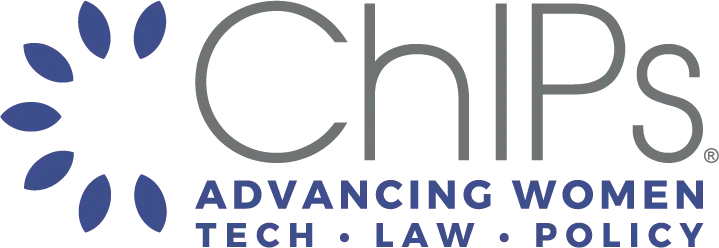Two
Decades of ChIPs
ChIPs is turning 20 this year!
To celebrate, ChIPs will be hosting events, sharing resources and creating opportunities to connect all year long.
Table of Contents
Male Allies and the Push for Gender Equality
An Action Guide
It is by standing up for the rights of girls and women that we truly measure up as men.
Archbishop Desmond Tutu, anti-apartheid and human rights activist.
As part of our 20th Anniversary, ChIPs is releasing action guides to help teams and individuals to advance gender equity in their organizations.
In this guide, ChIPs consults male allies on their journey to allyship, the perceptions of men’s involvement in gender equity versus the reality behind their involvement, and offers steps men and women can take to include men in the mission to advance women in the workplace.
Or, read the virtual report below.
Women Supporting Women
An Action Guide
Behind every great woman is another great woman."
Kate Hodges, Author, "I Know a Woman: The Inspiring Connections Between the Women Who Have Shaped Our World"
In this action guide, we outline tangible steps organizations and individuals can take to advance women in the workplace. By consulting both studies on gender equality and anecdotal data from ChIPs members, this guide explores both the current issues women face in the realms of hiring, promotion, and retention, as well as offers solutions for our members to engage with.
Or, read the virtual report below.
Impact Profiles
In honor of our 20th Anniversary, ChIPs is sitting down with leaders across the globe to discuss their work with and outside ChIPs, how they lean on their network and how they make an impact in their communities.
Impact Profile
Natalie Alfaro
Gonzales
Partner, Yetter Coleman LLP
Chapter Leader, ChIPs Texas Chapter
ChIPs Global Summit Committee Member
Member since 2015
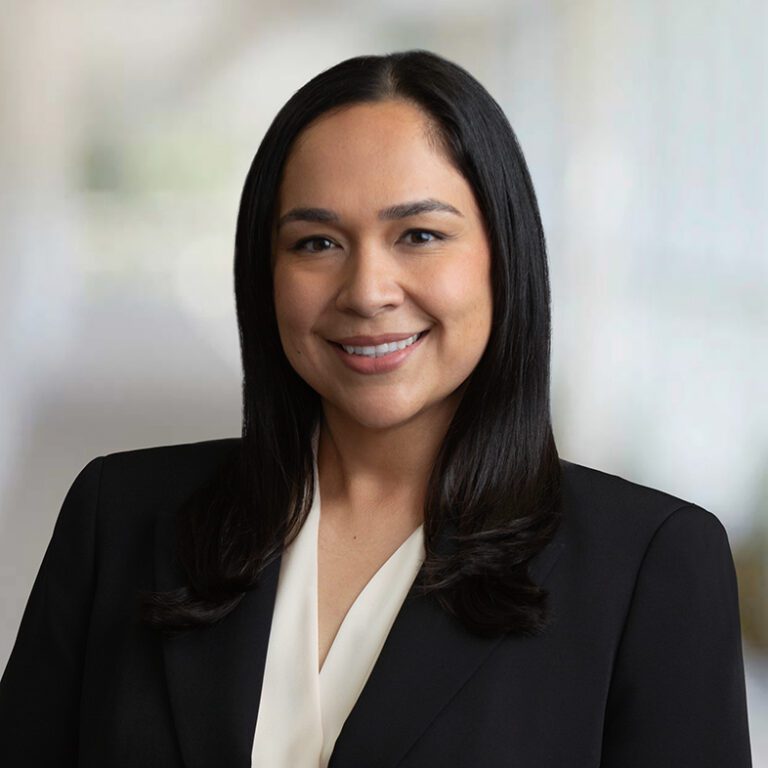
“I was a senior associate in Big Law when I participated in the ChIPs Mock Pitch event. I was so impressed by the very accomplished women — general counsel, law firm partners and other senior leaders — who were giving their time to serve as judges and offer feedback to help the next generation of women IP lawyers succeed. I felt the unique ChIPs sense of community from that first event and never looked back.
ChIPs is a special organization. Being a woman in tech is not easy, and being a woman IP litigator comes with its own separate challenges. But having this global community of passionate, highly motivated and supportive women to learn from has been a game changer for me. Seeing other women achieve their own successes — however success looks to them — then reach back to offer a hand to those coming up behind them has been inspirational and empowering.
My ChIPs experiences have been a driving force in helping me grow my network and build the confidence I need to thrive in my career. And I needed that confidence last April when I chose to leave Big Law, where I was comfortable, to join a premier trial boutique to continue to learn and grow my IP trial practice with a group of impressive trial lawyers. I chose to bet on myself, and no matter the outcome it was and will always be the ultimate power move.
The women of ChIPs have taught me a great deal about leadership, resilience and authenticity — traits I’ve found essential to finding my own success. I recognize the value of being real and authentic and leading that way, showing young women lawyers that everything won’t always be perfect — and it doesn’t have to be perfect to have the career you want and a fulfilling life.
Now, I hope to serve as an example of a first-chair trial lawyer who’s juggling family, self-care, work, business development, mentoring and community involvement — an example of a woman who found a way to have it all, just not all at the same time. Without an example of someone doing what you hope to be doing one day, that version of your ‘success’ seems out of reach, impossible even. If I can be that example for even one person, I’ve done my part.”
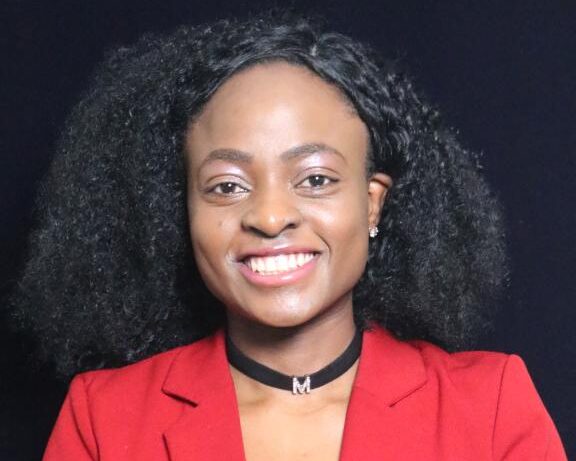
Impact Profile
Madelle Kangha
Contracts Manager & Business Line Attorney
Amazon
Silicon Valley, Innovation Community, and NextGen Community Member since 2024
“I first became involved with ChIPs when I attended the NextGen Summit. This innovative conference fostered valuable networking and meaningful dialogues. The insights I gained there significantly impacted my personal and professional self-perception.
Early in a career, it’s common to feel distant from highly accomplished women. At the NextGen Summit, I had the privilege of hearing directly from successful women leaders, including general counsels, chief legal officers and business founders. Their stories and advice provided me with strategies to assess my strengths, define my career aspirations and chart a path to achieve them.
I’ve also been fortunate to have female mentors — senior leaders at Amazon and outside of Amazon who have supported me throughout my career journey. These remarkable women have not only shared their expertise and insights but have provided invaluable guidance, helping me navigate complex professional situations and make informed decisions about my career trajectory.
My involvement with ChIPs has reinforced the importance of innovation, especially during times of change and disruption. It has taught me to consistently challenge the status quo and create novel solutions. I’ve developed greater confidence in taking on leadership roles in team projects, recognizing these as opportunities for future growth as a leader.
I serve as a contracts manager at Amazon, while also functioning as a business line lawyer. I manage contracts, offer legal guidance and continually learn from diverse challenges. Over time, these two roles have allowed me to leverage my individual strengths. I’ve learned to embrace the principle of “invent and simplify” by looking beyond immediate challenges to identify core business needs. Rather than accepting problems at face value, I developed a habit of questioning assumptions and seeking innovative solutions that align with broader business objectives.
For 2025, my focus is on personal and professional growth. I now make a conscious effort to connect with colleagues across genders and cultures, even if just for a few minutes each week. This simple change has significantly impacted how I’m perceived and enriched my professional experience.”
Impact Profile
Danielle Williams
Managing Partner, Charlotte and Co-Chair, Intellectual Property Group
Winston & Strawn
Co-Founder of ChIPs Carolinas Chapter
Member since 2011
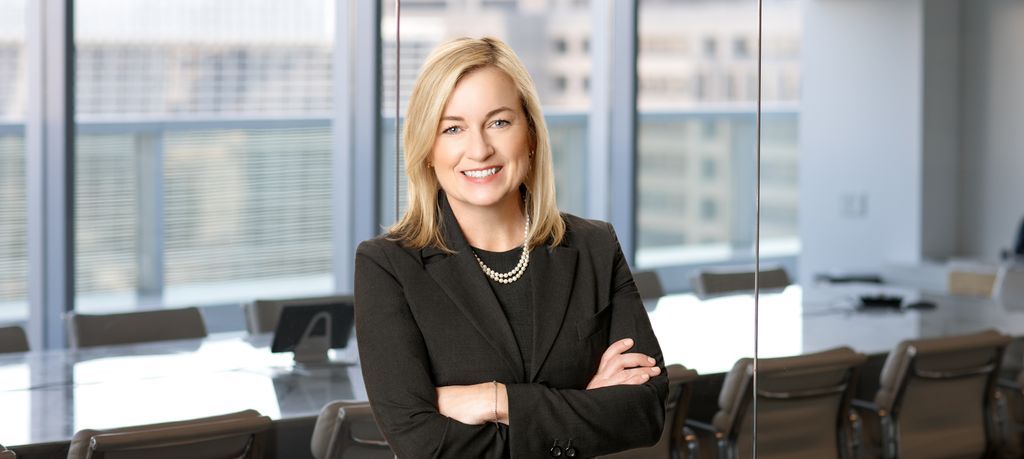
“I became involved in ChIPs because someone invited me to the Global Summit. I didn’t realize then what a gift that would be. When I arrived, I saw a room full of amazing women and knew I was in the right place with the right people. I absorbed as much of the positive energy as possible and ran on that until the next Global Summit. I’ve seen the power of inviting women to take part, whether it’s in ChIPs or in a work initiative, on someone’s career trajectory.
Participating in ChIPs, I learned to think bigger and be much more comfortable being a bigger thinker. I learned if you are enthusiastic about an idea and confident enough to share it, you can move that idea forward.
Being an active member of ChIPs, I’ve learned to be a better leader. I am aware of the importance of making sure everyone on your team understands their value—to pay attention and remind people why they’re great.
This accomplished group of women has taught me I will never know everything and that’s okay because there are so many smart people out there who have the knowledge and are willing to share. There is a societal expectation for women to do it all. That’s dumb. Sure, I can do it all, but I’d kill myself doing it. If I don’t have a skill or time to become an expert at something, it’s not just okay to ask for help to get information or tap into others’ talents, I get a better result for the team.”
Real Mentors, Real Stories
ChIPs is speaking with mentors and mentees about what makes a mentorship work, how you become a mentor and where all the mentors are.
“A mentor needs to create a safe space for a mentee to share goals and struggles and show their vulnerabilities.
-Whitney Smallwood
Director of Diversity & Inclusion, Fish & Richardson
How do you approach mentoring?
I’m a big fan of group mentoring, when possible. Group mentoring often works better than one-on-one mentoring, because sometimes the mentor and mentee hit it off, sometimes they don’t.
With a group, a mentee may develop a number of relationships within the group, with some ties stronger than others. At Fish, we’ve practiced pod mentoring with a group of eight people as part of our Women’s Initiative. The odds are you’ll connect with at least a handful of others.
Regardless of format, mentoring succeeds when there is a supportive and collaborative relationship with the mentee and mentor learning from each other. The best mentoring happens when there’s an open and honest exchange that allows for different perspectives, with the mentor practicing active listening and offering practical guidance that helps the mentee develop their own problem-solving skills and build confidence. It’s not about, “Here’s how you should do it.”
What traits should someone look for in a mentor?
Seek out someone who’s not just experienced but also genuinely interested in your growth and has the time and drive to funnel their knowledge to you. A mentor needs to create a safe space for a mentee to share goals and struggles and show their vulnerabilities.
The most effective mentors are approachable, open-minded and able to provide constructive feedback. It’s not all rainbows. As a mentee, you’ll learn the most if you’re willing to receive that feedback.
What most excites you about being a mentor?
I get personal satisfaction playing a part in someone’s growth and self-discovery, inspiring someone to reach their potential.
Is there a lesson you learned from a mentor that has made a lasting difference in how you approach your career or your life?
The mentor I’m thinking about is the reason I’m in the role I’m in now. I 100% would not have thought of this path for me. She saw something in me and challenged me to think of myself outside of the box I put myself in. She recognized my leadership skills and strategic mindset and pushed me to interview for this role. She put me in the right lane. Funny enough, this all took place at the 2019 ChIPs Global Summit! I left the Summit with a job description and interview scheduled. A great mentor is someone who sees your potential and seeks opportunities for you that you wouldn’t necessarily consider for yourself.
What’s something you wish you knew in the early years of your career?
I wish I knew how important my network would be. We enter a career and think we have time to build a network and will work on that later. But women should start from day one building connections at firms and in the industry. You’ll need people throughout your career. Starting to build your network 10 years in is too late to start.
Put the time in now. Schedule time on your calendar and set reminders. Make use of your ChiPs membership; you’re connected to thousands of professionals in the same industry. Take advantage of the many different ways ChIPs cultivates connections.
My mentors didn’t tell me what to do. I pushed the agenda.”
-Danielle Williams
Managing Partner, Winston & Strawn
How do you approach mentoring?
At Winston & Strawn, we have a formal mentorship program I’m proud of and is an essential component of the firm’s professional development strategy. The firm’s partners are supported through Winston’s Leadership Lab Apprenticeship Master Class, a unique course that covers the latest research and best practices for motivating, mentoring and teaching junior associates. All first- through third-year associates receive a mentor and mid-level and senior associates can choose to participate in the program as mentors or mentees. The program helps associates establish valuable connections with more-senior attorneys and gain knowledge, skills and experiences that advance their careers.
Also, our Diversity and Inclusion Associate Sponsorship Program pairs high-performing associates in their fifth or sixth year of practice with a sponsor for one year. Associates who belong to one of our affinity groups, including our Women’s Leadership Initiative, are eligible to apply. Twenty protégés from this program have been elevated to partner and four have been promoted to counsel.
Less formally, anyone in the ChIPs Carolinas Chapter knows I’m a phone call away. I also encourage law students, women and men, who are interested in IP to email me to set up a phone call, answer their questions and point them in the direction of ChIPs. On my teams, I hope everyone knows that when I’m at any office across the country, we can grab a coffee or have lunch or dinner and connect to see what is happening in their lives and careers.
What excites you about being a mentor?
I love mentees’ enthusiasm for the practice of law. I enjoy their excitement; it helps me to be mindful of what’s shiny and sparkly about what I do. Let’s be honest, some days are prettier than others and their enthusiasm gives me a boost. I value their new ideas and how they use technology to do things better, faster and easier.
What lessons did you learn from your own mentors that you carry with you?
I’ve had several mentors, men and women. Some of them didn’t realize they were mentoring me, but I absorbed all they said. One lesson that has stuck with me is to never underestimate the power of an invitation or a suggestion on someone’s decisions about their career. Another is to share how wonderful you view someone and what a great job someone is doing. When someone feels special, they feel they belong and want to participate and contribute.
What should mentees seek in a mentor?
I sought out big thinkers and high-energy people. Big thinkers can see beyond immediate tasks and help mentees understand the bigger picture, so they demonstrate how to set bold goals, think long-term and offer creative approaches to problems. High-energy mentors are passionate and driven, so they’re examples of how to stay focused, push through challenges and maintain a positive attitude even when faced with obstacles. My mentors didn’t tell me what to do. I pushed the agenda. They would help me brainstorm opportunities, but I would create those opportunities for myself.
When looking for a mentor, you may think, “Everyone’s busy. No one has time to mentor me.” But people will make time. The more excited you are to learn and grow, the more excited they will be to mentor you.
What is one piece of advice you’d share with rising associates?
The practice of law is a marathon, not a sprint. There is time to try new things, be part of something bigger, and otherwise maximize all available opportunities Winston has to offer. For me, it’s important to keep innovating.
ChIPs History
Learn more about the past 20 years of ChIPs.
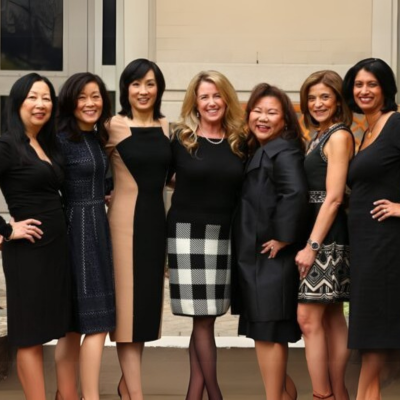
ChIPs Founded
Julie Mar-Spinola, Mallun Yen, Michelle Lee, Noreen Krall, Emily Ward, Mona Sabet and Anirma Gupta launched ChIPs as a space for women in leadership positions in IP to support and advance one another.
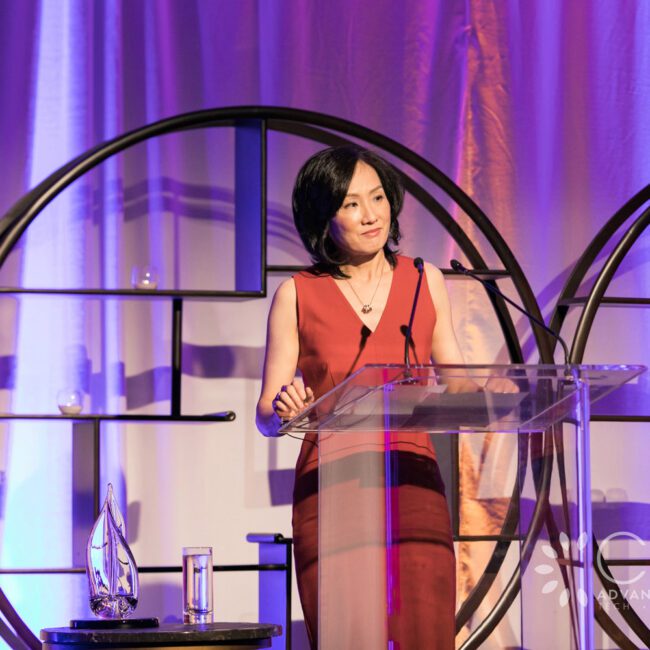
ChIPs Hosted First Global Summit
Our founders created the ChIPs Global Summit as a conference for women in IP to connect, network and learn. Two hundred women joined us in 2011. Today, more than 800 leaders participate in the ChIPs Global Summit.
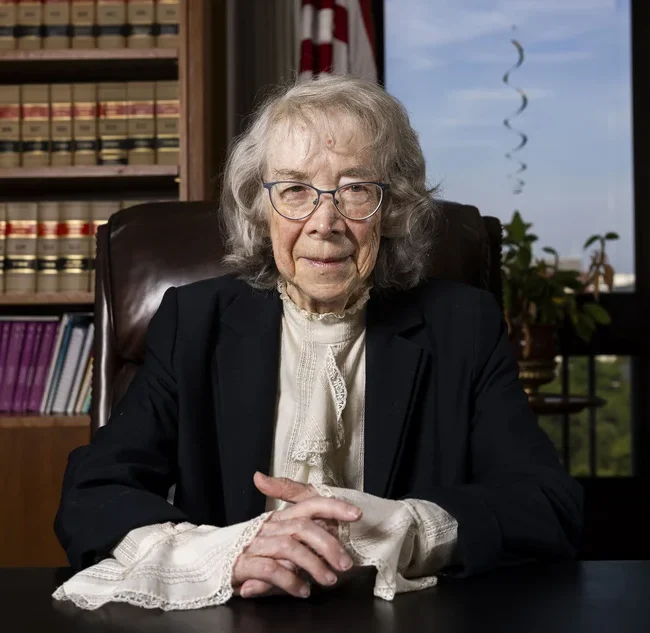
Hall of Fame Established
ChIPs established the Hall of Fame to honor leaders and inspire the next generation. Our first award was given to trailblazer Pauline Newman.
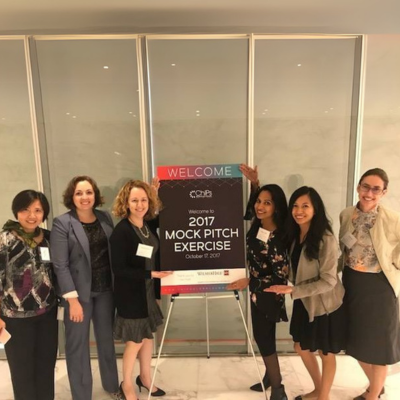
Mock Program Launched
ChIPs developed the Mock Pitch program to create an opportunity for associates and junior partners to gain real-life experience pitching to clients, a necessary skill to elevate their careers and increase pay equity.

Michelle Lee Confirmed as Undersecretary of Commerce
ChIPs founder Michelle Lee was the first woman to serve as Undersecretary of Commerce for Intellectual Property. She also served as the Director of the USPTO in conjunction with her undersecretary work.
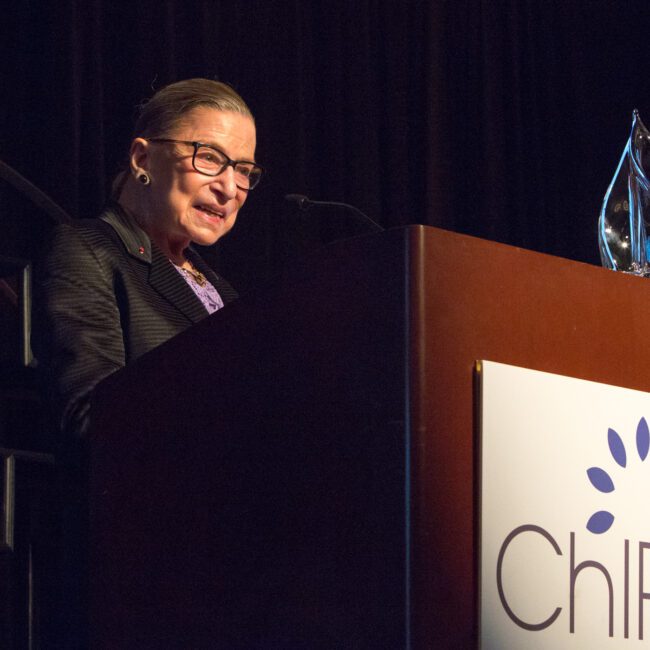
Ginsburgs Inducted to ChIPs Hall of Fame
Supreme Court Justice and trailblazer Ruth Bader Ginsburg was inducted into the ChIPs Hall of Fame along with her daughter Jane C. Ginsburg.
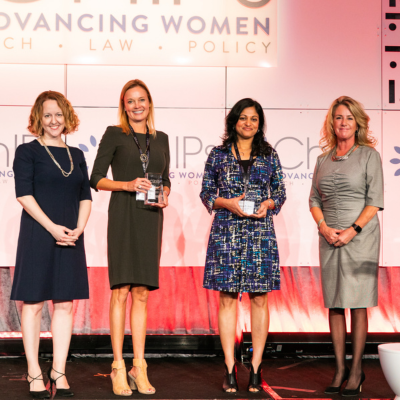
First Firms Named to Honor Roll Celebrated
ChIPs established its Honor Roll as a joint initiative with Diversity Lab. Honorees are based on findings from Diversity Lab’s Inclusion Blueprint, which provides diversity benchmarks of historically underrepresented groups (female lawyers, underrepresented racial/ethnic lawyers, LGBTQ+ lawyers and lawyers with disabilities) in law firm leadership and across practice groups, including IP.

ChIPs Hosted First NextGen Summit
ChIPs created the NextGen Summit to prepare women lawyers for careers in intellectual property.
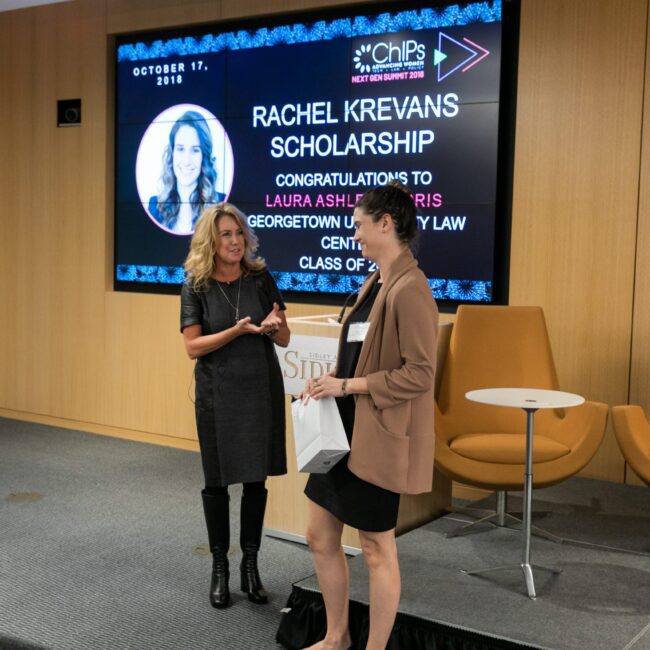
Inaugural ChIPs Scholarship Awarded
The ChIPs Scholarship was created with a generous contribution from Morrison & Foerster to honor Rachel Krevans, a renowned intellectual property litigator from the firm. Our first awardee, Laura Ashley Harris of Georgetown University Law, went on to work for the U.S. Court of Appeals for the Federal Circuit.
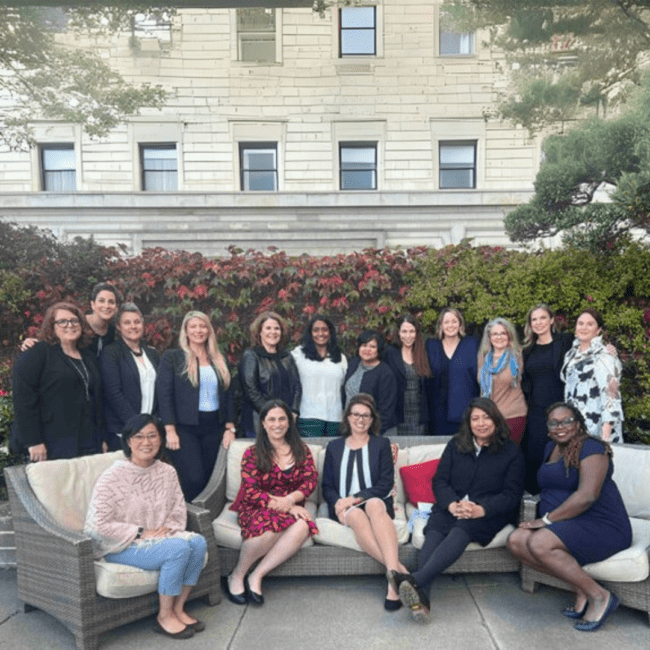
General Counsel Boot Camp Launched
ChIPs developed a transformative 12-month program for women in-house attorneys aspiring to a general counsel role.
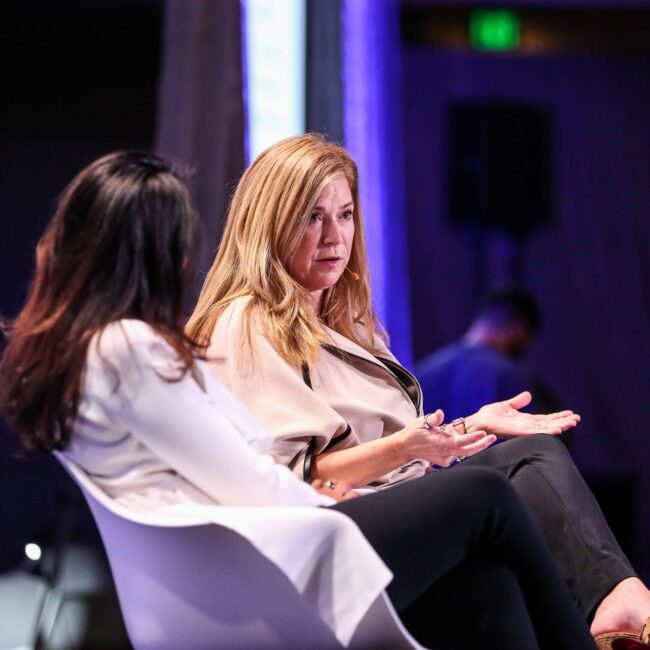
Kathi Vidal Confirmed as USPTO Director
Founding member of ChIPs Kathi Vidal became the second woman to lead the USPTO and serve as Undersecretary of Commerce for Intellectual Property.

ChIPs and USPTO Signed MOU
ChIPs and the USPTO signed a memorandum of understanding agreeing to work together to advance women inventors and innovators. ChIPs and USPTO are providing Innovation Resources as we continue to aggregate research and reports on innovation and inclusion, including guidebooks to best practices and mentoring.

Ketanji Brown Jackson Shared Her Life Story
Supreme Court Justice Ketanji Brown Jackson shared the story of her trailblazing journey with 2024 ChIPs Global Summit attendees.
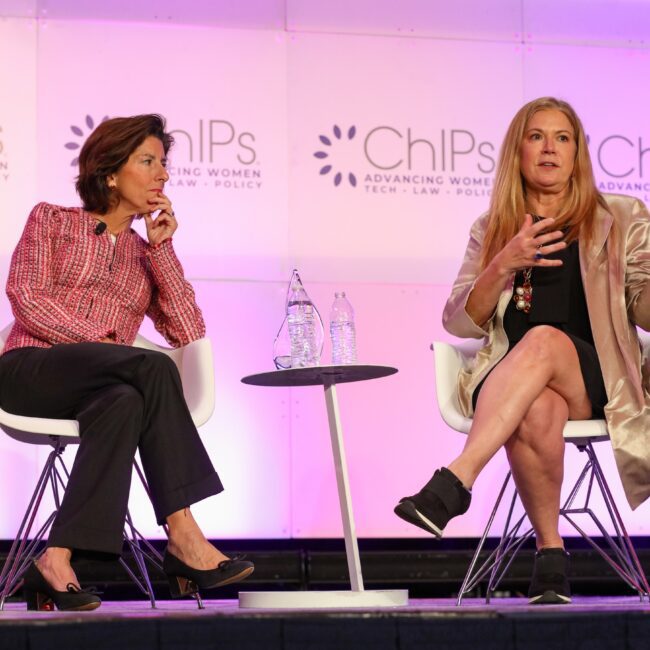
Dual Hall of Fame Awarded
Secretary of Commerce Gina Raimondo and Undersecretary of Commerce for Intellectual Property Kathi Vidal were honored with induction into the ChIPs Hall of Fame. Their efforts to expand patent access and education to women and people of color helped thousands of U.S. inventors.
Test Your Knowledge
Question
Question
Question
Question
Women Inventors, Inventors of Color, and Patents
Patent History in the U.S.
Congress passed the first patent statute in U.S. history on April 10. After the passage of the act, the first Patent Board, made up of Secretary of State Thomas Jefferson, Secretary of War Henry Knox and Attorney General Edmund Randolph, began examining patents.
The first U.S. patent was granted to Samuel Hopkins for a process of making potash, an ingredient used in fertilizer, on July 31. President George Washington signed the first patent.
Mary Dixon Kies was the first woman to apply and receive a U.S. Patent in her own name. She created a process for weaving straw with silk that was adopted by the New England hat-making industry.
U.S. patent no. 1 was granted to Senator John Ruggles for a traction wheel for steam locomotives on July 13. The 9,957 patents granted before the numbering system are now known as the X-patents.
Clara Barton began work as a clerk at the Patent Office. She was paid equal wages, but faced discrimination from her male coworkers and eventually lost her job. She was later rehired during the Lincoln administration and went on to blaze trails as a relief worker during and after the Civil War.
After the 14th Amendment was passed in 1868, African Americans were able to gain citizenship and patenting activity increased significantly.
The first female patent examiner, Anne Freeman, was hired by the Patent Office.
Charlotte Smith published "Women Inventors to Whom Patents Have Been Granted," outlining the comparatively small number of patents obtained by women. Smith was an economic feminist concerned with women's ability to earn income for themselves.
Harriet R. Tracy was awarded 16 patents and sold her inventions at the Chicago World's Fair.
From 1882 to 1940, extrajudicial killings and loss of personal security depressed patent activity among Black people by more than 15% annually.
Sara E. Goode, a Chicago furniture store owner, created a "folding cabinet bed" similar to today's sofa bed. Goode was one of the small number of African American women to patent their inventions.
Josephine Cochrane invented the dishwasher.
The brassiere was invented by Mary Phelps Jacob.
Disposable diapers were invented, highlighting women's need for inventions serving home labor and the exclusion of women from public labor fields.
Women made up 22% of names on patent applications.
More registered U.S. patent attorneys and agents were named "Michael" than were women of color.
